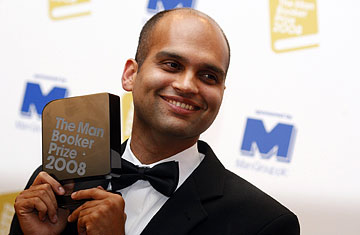
Indian author Aravind Adiga won the 2008 Man Booker Prize for The White Tiger
Aravind Adiga won the Man Booker Prize on Tuesday night with his novel, The White Tiger, joining a pantheon of past Booker winners that includes such literary giants as V.S. Naipaul, Nadine Gordimer, Iris Murdoch, Kingsley Amis and Salman Rushdie. It was a remarkable victory for Adiga, a 33-year-old first-time novelist who spent part of his youth in the Indian city of Mangalore and now lives in Bombay. As an old friend of his, I was sitting at the table with Adiga in London's Guildhall when he won, surrounded by people from his U.K. publishing house, Atlantic Books. The mood at the table was one of ecstatic disbelief. Toby Mundy, chairman of Atlantic, told me: "I'm completely gobsmacked. I'm completely nonplussed." To Mundy, this was not just a literary triumph but a commercial one. He reckons the book could now sell as many as a million copies worldwide, including 500,000 in the U.K. alone. Such is the financial power of the Booker Prize, Britain's most prestigious literary award.
For Ravi Mirchandani, who edited Adiga's book and was sitting beside him at the table, the win was especially sweet. The White Tiger was the first book he bought for Atlantic, which hired him in 2006 after he was fired from a job at Random House. The novel was shown to him by Adiga's agent, who insisted that he read it that night and make an almost instant decision about whether to bid for it. "I sat down with the manuscript and after the first six pages I was just so excited," Mirchandani said. "When you're reading a first novel, you're often thinking: 'This is fantastic, keep it up, keep it up' " — only to find the writer stumbles and falls. In Adiga's case, Mirchandani said, "The voice is fantastic and it never falters."
Indeed, Adiga's book is extraordinarily accomplished. The tale of an Indian servant who kills his boss, it's written with wit and panache and crackles with a kind of joyfully subversive energy. Yet it is also a shocking portrait of Indian corruption and social injustice at a time when the media has tended to focus on sunnier tales of the nation's economic transformation. Sitting beside Adiga in a taxi after the event, he told me that he had initially struggled to write the book in the third person and had then rewritten it in just 40 days in the voice of the murderous servant. Back then, Adiga had just resigned from his job as a New Delhi correspondent for TIME, and he was writing with a sense of freedom that he said came from the fact that he had "nothing to lose." He has often been plagued by self-doubt, he told me, but he wrote The White Tiger in a state of calm and happiness, knowing even then that he was creating "something special."
The Booker judges certainly felt so. Michael Portillo, who chaired the panel of judges and presented Adiga with a check for 50,000 pounds ($87,283) in prize money, told me that part of what thrilled him about The White Tiger is that it's as disturbing as it is entertaining. "This book changed me," Portillo said. "It changed my view of certain things, like what is the real India and what is the nature of poverty." Another of the judges, who asked not to be named, confided that it was "a very tricky choice" between Adiga's book and the judges' second favorite of the six shortlisted novels, Sebastian Barry's The Secret Scripture. As this judge saw it, Barry's novel was a great display of beautiful writing, while Adiga's novel was a masterful example of "crackling story-telling" and was "one of the most incredible books I've ever read." In the end, he said, Adiga won by "the narrowest of margins."
For Adiga, the formidable challenge now is to follow the spectacular success of his debut. As he headed back to his hotel at around 1 a.m., he was both giddy with delight and keenly aware of the enormous expectations that will face him at every turn. He chuckled when I told him that a renowned novelist had jokingly berated one of the judges, complaining that a triumph this early in a novelist's career was bound to destroy him. He already feels the pressure. For now, though, there is a barrage of interviews to endure before he returns to Bombay later this week. And then, it's back to the joyous solitude of writing his next book.
(Click here for further reaction from India on Adiga's triumph.)
